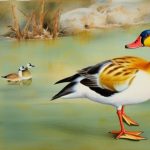Ducks are not only known for their adorable appearance and amusing quacks, but they are also excellent egg layers. Duck eggs are larger and have a richer flavor compared to chicken eggs, making them a popular choice for baking and cooking. When it comes to duck breeds for egg production, there are several options to consider, each with its own unique characteristics and qualities. Whether you are a small-scale farmer or a backyard enthusiast, choosing the right duck breed for egg production is essential for a successful and sustainable operation. In this article, we will explore some of the most popular duck breeds for egg laying, their characteristics, and the factors to consider when choosing the right breed for your specific needs. Additionally, we will provide some tips for raising ducks for egg production and address common challenges that may arise in the process.
Key Takeaways
- Duck breeds for egg production are diverse and offer a range of qualities and characteristics.
- Popular duck breeds for egg laying include the Khaki Campbell, Indian Runner, and Pekin ducks.
- Each duck breed has unique characteristics such as egg production, temperament, and foraging ability.
- Factors to consider when choosing a duck breed for egg production include climate, space, and desired egg production.
- Tips for raising ducks for egg production include providing proper housing, nutrition, and access to water.
Popular Duck Breeds for Egg Laying
1. Khaki Campbell
The Khaki Campbell duck is a popular choice for egg production due to its exceptional laying abilities. This breed is known for its high egg production, with hens laying up to 300 eggs per year. Khaki Campbells are also known for their calm and friendly demeanor, making them a great addition to any backyard flock. Their khaki-colored feathers and slender build make them an attractive breed for those looking to add beauty to their farm or homestead.
2. Indian Runner
The Indian Runner duck is another popular choice for egg production, known for its upright stance and distinctive appearance. These ducks are excellent layers, with hens laying up to 200 eggs per year. Indian Runners are also known for their active and curious nature, often entertaining their owners with their comical behavior. Their unique upright posture and slender build make them stand out in any flock, adding a touch of charm to the farm or backyard.
Characteristics and Qualities of Each Duck Breed
1. Khaki Campbell
The Khaki Campbell duck is a medium-sized breed with a khaki-colored plumage that gives them a sleek and elegant appearance. They are known for their excellent egg-laying abilities, with hens laying large white eggs at an impressive rate. Khaki Campbells are also known for their calm and friendly temperament, making them easy to handle and a great choice for beginners. Additionally, they are efficient foragers and do well in free-range environments, making them a sustainable choice for egg production.
2. Indian Runner
The Indian Runner duck is a unique breed known for its upright stance and slender build. They come in a variety of colors, including fawn, white, and black, adding diversity to any flock. Indian Runners are excellent layers, producing large white eggs at a steady rate. They are also known for their active and curious nature, often exploring their surroundings with enthusiasm. Their comical behavior and distinctive appearance make them a delightful addition to any farm or backyard.
Factors to Consider When Choosing a Duck Breed for Egg Production
When choosing a duck breed for egg production, there are several factors to consider to ensure the success of your operation. Some of the key factors to keep in mind include the climate and environment in which the ducks will be raised, the space available for the flock, and the specific goals of the egg production venture. Additionally, it is important to consider the temperament and behavior of the duck breed, as well as their ability to thrive in free-range or confined environments. Another important factor to consider is the availability of resources such as feed, water, and shelter, as different duck breeds may have varying requirements in these areas. By carefully considering these factors, you can choose the right duck breed for egg production that aligns with your specific needs and goals.
Tips for Raising Ducks for Egg Production
1. Provide Adequate Shelter and Space
When raising ducks for egg production, it is important to provide them with adequate shelter and space to ensure their health and well-being. Ducks require protection from predators and the elements, so a secure coop or shelter is essential. Additionally, ducks need ample space to roam and forage, so providing a spacious outdoor area is important for their physical and mental enrichment.
2. Balanced Nutrition
Proper nutrition is crucial for egg production in ducks. A balanced diet that includes commercial feed, fresh water, and access to greens and insects will help ensure that your ducks lay high-quality eggs consistently. It is important to provide a diet that meets the nutritional needs of laying ducks to support their overall health and egg-laying capabilities.
Common Challenges in Duck Egg Production

1. Predators
One common challenge in duck egg production is the threat of predators such as foxes, raccoons, and birds of prey. These predators can pose a significant risk to the safety of your ducks and can impact egg production if not properly managed. Implementing predator-proof fencing, secure coops, and using guard animals such as dogs can help mitigate the risk of predation.
2. Health Issues
Ducks are susceptible to various health issues that can impact their egg-laying abilities. Common health concerns include respiratory infections, parasites, and reproductive disorders. Regular health checks, proper sanitation practices, and access to veterinary care can help prevent and address potential health issues in your duck flock.
Conclusion and Final Thoughts on Duck Breeds for Egg Production
In conclusion, choosing the right duck breed for egg production is essential for a successful and sustainable operation. Whether you opt for the high-producing Khaki Campbell or the charming Indian Runner, each duck breed has its own unique characteristics and qualities that make them suitable for egg-laying purposes. By considering factors such as climate, space, temperament, and resource availability, you can select the ideal duck breed that aligns with your specific needs and goals. Additionally, providing adequate shelter, balanced nutrition, and addressing common challenges such as predation and health issues will contribute to the overall success of your duck egg production venture. With proper care and management, raising ducks for egg production can be a rewarding experience that provides you with a bountiful supply of delicious and nutritious eggs.
If you’re interested in learning more about different duck breeds for egg production, be sure to check out Poultry Wizard’s article on the best chicken coop designs for maximizing egg production. This informative piece provides valuable insights into creating the ideal environment for your ducks to thrive and lay plenty of eggs. You can read the article here.
FAQs
What are the best duck breeds for egg production?
Some of the best duck breeds for egg production include the Khaki Campbell, Indian Runner, and the Welsh Harlequin. These breeds are known for their high egg production and are popular choices for small-scale egg farming.
How many eggs can a duck lay in a year?
On average, a duck can lay between 150-300 eggs per year, depending on the breed and individual bird. Some high-producing breeds can lay even more eggs in a year.
At what age do ducks start laying eggs?
Ducks typically start laying eggs at around 5-7 months of age, although this can vary depending on the breed and individual bird. It’s important to provide proper nutrition and a suitable environment to encourage egg production.
What should I feed ducks to encourage egg production?
To encourage egg production, ducks should be fed a balanced diet that includes a commercial poultry feed with at least 16% protein. Additionally, providing access to fresh water, greens, and occasional treats like mealworms can also support egg production.
How long do duck eggs take to hatch?
Duck eggs typically take around 28 days to hatch, although this can vary slightly depending on the breed and the specific incubation conditions. It’s important to provide a warm and stable environment for the eggs during the incubation period.
Meet Walter, the feathered-friend fanatic of Florida! Nestled in the sunshine state, Walter struts through life with his feathered companions, clucking his way to happiness. With a coop that’s fancier than a five-star hotel, he’s the Don Juan of the chicken world. When he’s not teaching his hens to do the cha-cha, you’ll find him in a heated debate with his prized rooster, Sir Clucks-a-Lot. Walter’s poultry passion is no yolk; he’s the sunny-side-up guy you never knew you needed in your flock of friends!







